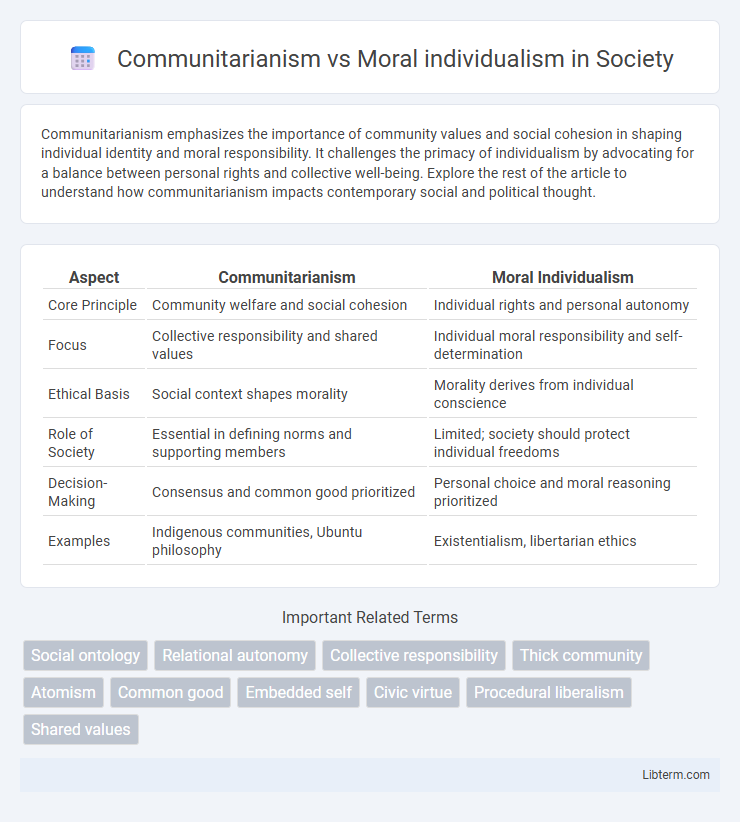Communitarianism emphasizes the importance of community values and social cohesion in shaping individual identity and moral responsibility. It challenges the primacy of individualism by advocating for a balance between personal rights and collective well-being. Explore the rest of the article to understand how communitarianism impacts contemporary social and political thought.
Table of Comparison
| Aspect | Communitarianism | Moral Individualism |
|---|---|---|
| Core Principle | Community welfare and social cohesion | Individual rights and personal autonomy |
| Focus | Collective responsibility and shared values | Individual moral responsibility and self-determination |
| Ethical Basis | Social context shapes morality | Morality derives from individual conscience |
| Role of Society | Essential in defining norms and supporting members | Limited; society should protect individual freedoms |
| Decision-Making | Consensus and common good prioritized | Personal choice and moral reasoning prioritized |
| Examples | Indigenous communities, Ubuntu philosophy | Existentialism, libertarian ethics |
Understanding Communitarianism: Core Principles
Communitarianism emphasizes the significance of community values, social practices, and collective responsibilities in shaping individual identity and moral obligations. It argues that individuals are deeply embedded within social contexts, where communal norms guide ethical behavior and foster social cohesion. Core principles include prioritizing the common good, mutual respect, and the interdependence between personal rights and social duties.
Foundations of Moral Individualism
Foundations of moral individualism emphasize the intrinsic worth and autonomy of each person, asserting that moral judgments must respect individual rights and freedoms independent of social roles or collective identities. This framework prioritizes personal conscience and rational agency, guiding ethical decisions based on individual dignity rather than communal norms. It contrasts with communitarianism by foregrounding the individual's moral agency as the primary basis for ethical responsibility.
The Historical Evolution of Both Philosophies
Communitarianism emerged as a reaction to the rise of moral individualism, emphasizing the importance of social contexts, traditions, and community values in shaping individual identity, rooted historically in the works of philosophers like Alasdair MacIntyre and Charles Taylor in the late 20th century. Moral individualism, tracing back to Enlightenment thinkers such as Immanuel Kant and John Locke, prioritizes the autonomy and rights of the individual, arguing that moral principles derive from rational self-interest and universal human rights. The historical evolution of both philosophies reflects a shift from collective social obligations to individual autonomy, influencing contemporary debates in ethics, politics, and social theory.
Key Thinkers and Influential Theories
Communitarianism, championed by thinkers like Charles Taylor and Michael Sandel, emphasizes the role of community values and social contexts shaping individual identities and moral duties. Moral individualism, articulated by philosophers such as John Rawls and Immanuel Kant, prioritizes the autonomy and rights of individuals, advocating for universal principles of justice and ethics irrespective of social affiliations. The debate contrasts communitarian critiques of Rawlsian liberalism with individualist assertions that moral agents should be free from communal constraints.
Community Values vs. Personal Autonomy
Communitarianism emphasizes the importance of community values, arguing that individual identity and moral understanding are fundamentally shaped by social contexts and shared cultural norms. Moral individualism prioritizes personal autonomy and the right of individuals to make ethical decisions independently of communal pressures. The tension between these perspectives centers on whether collective well-being or individual freedom should guide ethical behavior and societal organization.
Social Responsibility: Collective Good or Individual Rights?
Communitarianism emphasizes social responsibility by prioritizing the collective good and the interconnectedness of individuals within a community, advocating that individual rights should be balanced with communal welfare and social cohesion. Moral individualism stresses the primacy of individual rights, asserting that personal autonomy and freedom are fundamental, often resisting communal obligations that might infringe on personal liberties. The debate centers on whether ethical frameworks should promote the well-being of society as a whole or safeguard the moral agency of each individual, influencing policies on social justice, civic duties, and human rights.
Real-World Applications and Societal Impacts
Communitarianism emphasizes the role of community values and social cohesion in shaping ethical behavior, influencing policies that prioritize collective well-being and social responsibility, such as public health initiatives and community-based education programs. Moral individualism focuses on personal autonomy and individual rights, impacting legal frameworks that protect freedom of speech, personal privacy, and individual choice in healthcare. Real-world applications of these philosophies affect societal debates on balancing communal interests with individual liberties, shaping governance models and social welfare systems globally.
Balancing Community and Individual Ethics
Communitarianism emphasizes the importance of social contexts and communal values in shaping ethical principles, advocating that individual behavior should align with the collective well-being of the community. Moral individualism prioritizes personal autonomy and the rights of the individual, arguing that ethical decisions are grounded in individual reasoning and personal moral agency. Balancing these perspectives involves integrating community responsibilities with respect for individual freedoms, ensuring ethical frameworks support social cohesion without compromising personal integrity.
Critiques and Limitations of Each Perspective
Communitarianism faces critiques for potentially suppressing individual rights in favor of collective norms, often leading to conformity and limiting personal autonomy. Moral individualism is criticized for neglecting the social contexts that shape ethical behavior, resulting in an overly atomistic view that may overlook communal responsibilities. Both perspectives struggle to fully integrate the balance between individual freedom and social cohesion, highlighting their limitations in addressing complex moral dilemmas.
Future Directions: Reconciling Communitarianism and Moral Individualism
Future directions in reconciling communitarianism and moral individualism emphasize integrating community values with individual rights to foster social cohesion and personal autonomy. Philosophers advocate for frameworks that respect cultural traditions while promoting individual moral agency, creating balanced ethical systems. Emerging interdisciplinary approaches employ dialogue between communal norms and individual ethics to address complex societal challenges.
Communitarianism Infographic

 libterm.com
libterm.com